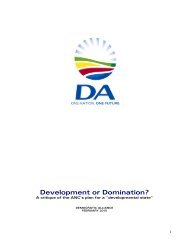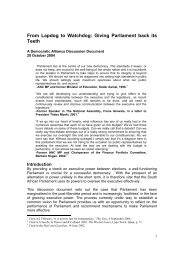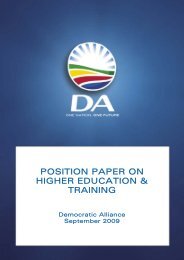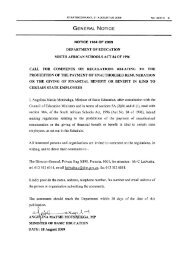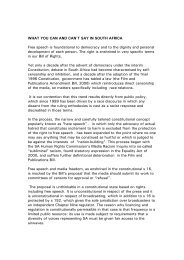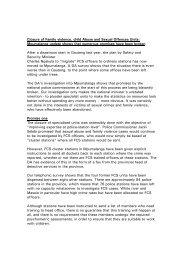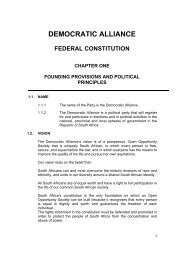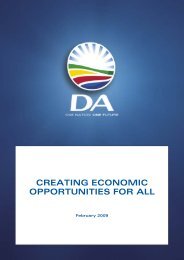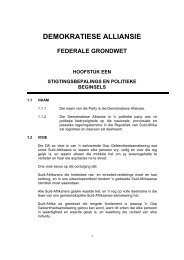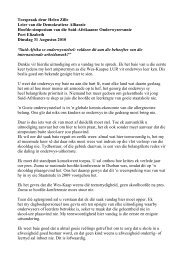DA's Plan for Growth and Jobs - Democratic Alliance
DA's Plan for Growth and Jobs - Democratic Alliance
DA's Plan for Growth and Jobs - Democratic Alliance
Create successful ePaper yourself
Turn your PDF publications into a flip-book with our unique Google optimized e-Paper software.
unemployment. In these countries, the end of poverty is not a vain promise. The reality is insight.However, no country that has tackled the interrelated challenges of poverty <strong>and</strong>unemployment successfully has done so in the absence of high rates of investment <strong>and</strong>strong economic growth. Both are necessary to create new wealth <strong>and</strong> opportunities. Aneconomy capable of doing this has more to share: enough, <strong>for</strong> all, <strong>for</strong>ever.The DA has closely studied the experiences of these high-growth developing countries in thedevelopment of this plan, which focuses on five key areas:Opening job opportunities to all: Breaking down barriers to entry in the job marketrequires multi-faceted re<strong>for</strong>m programme that creates incentives that encouragebusinesses to hire more people; that ensures delivery of high-quality education <strong>and</strong>training so that job-seekers have marketable skills; that makes it is easier <strong>for</strong> youngpeople to access employment by reducing barriers to entry faced by first-time jobseekers; that ensures a fairer relationship between work <strong>and</strong> pay; <strong>and</strong> that allowspeople with drive <strong>and</strong> determination to reach their full potential.Breaking down barriers to inclusion: The priority of this section is to make it easier<strong>for</strong> poor South Africans to have a real stake in the economy. It includes policyproposals ranging from financial incentives to enhance Broad-Based BEE <strong>and</strong> extendthese benefits to non-listed companies; legislative changes to make it easier <strong>for</strong> poor<strong>and</strong> low-income households to own the homes they live in; additional stateassistance to expedite l<strong>and</strong> re<strong>for</strong>m <strong>and</strong> broaden ownership in the agricultural sector;<strong>and</strong> changes to the social security system to make it more proactive in helpingpeople bridge the gap between poverty <strong>and</strong> opportunity. Half of all policies in thissection are designed to help poor South Africans own assets.Opening the economy to competition: Breaking down the barriers that keep thecost of living high, <strong>and</strong> protect economic insiders from competition from new <strong>and</strong>innovative entrepreneurs, requires a range of policy interventions that challengeestablished interests. The section includes policies designed to: augment the powers,<strong>and</strong> increase the budget allocations <strong>for</strong> the competition authorities <strong>and</strong> the NationalConsumer Commission; slash red tape so that it is easier <strong>for</strong> people to start <strong>and</strong> grownew businesses; create an environment that actively encourages innovation <strong>and</strong>entrepreneurship; ensure that government support services that are reliable, efficient,high-quality <strong>and</strong> corruption-free.Building the base through trade <strong>and</strong> investment: Breaking down barriers to tradewith Africa <strong>and</strong> the world, <strong>and</strong> building the foundations <strong>for</strong> long-term growth byreorienting fiscal policy to prioritise investment, are the two fundamental cornerstonesof the DA’s growth strategy <strong>for</strong> South Africa. This section explains how we plan to:engage Africa as a strategic market <strong>and</strong> economic partner; radically simplify the rules<strong>and</strong> procedures involved in importing <strong>and</strong> exporting goods in <strong>and</strong> out of the country;increase infrastructure investment to 10% of GDP to deal with current backlogs;rationalise South Africa’s state-owned enterprises; <strong>and</strong> eliminate wastefulexpenditure through tighter fiscal governance so that our resources go to building theeconomic base rather than lining the pockets of politically-connected elites.A sustainable future <strong>for</strong> all: Achieving inclusive, job-creating economic growth thatis sustainable in the long-term requires that we develop smarter ways to manage ournatural resources by living within our means; putting our country’s energy securityback on track, <strong>and</strong> tackling climate change <strong>and</strong> pollution in ways that create, rather86 | P a g e



